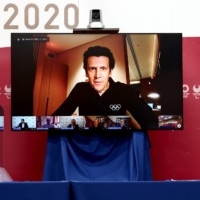Foreign athletes competing at this summer’s Tokyo Olympics and Paralympics could be kicked out of Japan if they violate regulations aimed at preventing the spread of coronavirus infections, according to a rule book released Tuesday.
The third and the newest version of the so-called playbook with various COVID-19 countermeasures said athletes also face other penalties for not complying with them, including a withdrawal of accreditation and the right to participate in the games, as well as facing a fine.
“There may be consequences imposed upon you in the event of a breach of these measures or instructions, such as being subject to strict administrative measures including procedures for revocation of your permit of stay in Japan,” it said, while noting that some of the steps are under the jurisdiction of Japanese authorities.
The rule book, which was created by organizers with advice from the World Health Organization, specified how and when athletes will be screened for the virus during the games, as well as what will happen if a participant tests positive.
Athletes, who will be screened for the virus on a daily basis, in principle, need to submit saliva samples either at 9 a.m. or 6 p.m. through COVID-19 liaison officers of their respective national Olympic committees, according to the organizers.
If the result comes back positive, they will take a polymerase chain reaction (PCR) test, conducted using a nasal swab.
An infection control center set up by the organizing committee is responsible for confirming a positive COVID-19 test or deciding who came into close contact with someone who tested positive.
The center will coordinate with a support unit operated by officials of the International Olympic Committee and the International Paralympic Committee.
The rules will take effect on July 1, the organizers said. The playbooks for officials and workers, including those affiliated with corporate sponsors and the media, will be released at a later date.
The Tokyo Olympics and Paralympics will feature about 15,000 athletes from across the world. There will be up to about 78,000 officials and workers from overseas, less than half the initially planned 180,000.
With just over a month until the Olympic opening, IOC President Thomas Bach said last week that the organizers are in a “full delivery phase.”
The organizers, also including the Japanese and the Tokyo metropolitan governments, have already decided not to hold the major sporting event with spectators from overseas.
They will decide later this month on a policy regarding spectators who live in Japan, while the Japanese government is moving closer to allow at least some people to enter venues, as many as 10,000.
Tokyo and some other areas in the country are currently under a state of emergency. The government will likely end the emergency on June 20 as a fourth wave of infections has somewhat abated.
However, the government is considering placing Tokyo under a quasi-state of emergency during the Olympics after many health experts have expressed concern over a potential spike in COVID-19 cases.
In a time of both misinformation and too much information, quality journalism is more crucial than ever.
By subscribing, you can help us get the story right.
SUBSCRIBE NOW



